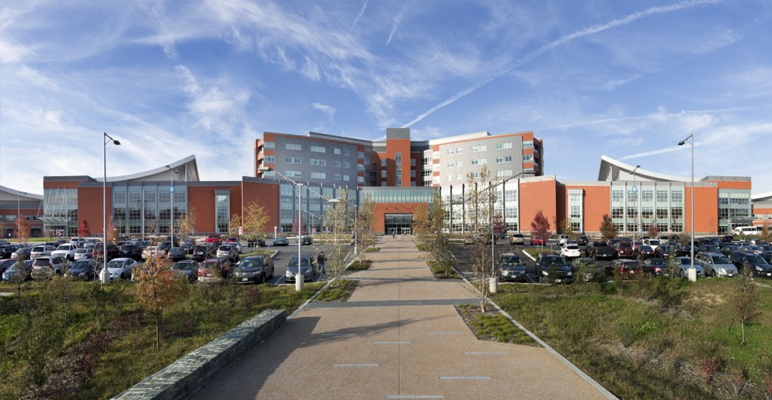
The Department of the Army awarded VHT with the Integrative Pain Clinic contract for the Fort Belvoir Community Hospital. In the first of its kind for the US Army, Vesa Health and Technology personnel provide alternative options to treat chronic pain for our wounded warriors. The clinic is staffed with a Physician Acupuncturist, a Physician’s Assistant for Chronic Pain, Registered Nurse for Acute Pain, Registered Nurse for Chronic Pain and Integrative Pain Management and a Licensed Practical Nurse.
This clinic offers multidisciplinary, individualized treatment plan for warriors, retirees, dependents and caregivers for chronic pain ailments without first dispensing pharmaceuticals. The clinic also seek ways to wean current individuals off of current pain medication treatment plans. The staffed positions carry very specific requirements ensuring that the soldiers are getting the absolute best of class treatment. This treatment clinic also interfaces with the Traumatic Brain Injury Clinic already in operation at Fort Belvoir to share information and best practices.
Vesa Health and Technology also provides Healthcare Professionals to Ireland Army Community Hospital (Ft. Knox, KY). These health care providers include a Neurologist, a licensed practical nurse and a licensed clinical social worker who support the Traumatic Brain Injury (TBI) Clinic for the U.S. Army Medical Department Activity (USA MEDDAC) at Fort Knox, Kentucky.
TBI is considered the signature injury of the wars in Iraq and Afghanistan; the Department of Defense has invested millions of dollars to diagnose, treat, rehabilitate, and reintegrate Soldiers into their units if they want to stay on active duty.
IACH Commander Col. Rhonda Earls said that the clinic was developed for Soldiers who experience the blasts of Improvised Explosive Devices – and not just once or twice. “I saw a Soldier who had sustained nine IED blasts in 15 months,” Earls said.
Trish Burtoft, a physician assistant, oversees the Tele-A-Nurse program, another part of the TBI clinic. With a large TV screen and telephone link, Burtoft can conduct a consultation with a neurologist at Walter Reed on a patient standing in the TBI clinic.
While the staff will help screen patients and determine their deficits, physicians will treat the symptoms. Because there is so much similarity between TBI and PTSD symptoms, it requires a team to cover all the problems, which affect memory, balance, sleep, and mood. “Nothing is more wonderful than seeing all this happen in one place,” Burtoft explained.

The Department of the Army awarded VHT with the Integrative Pain Clinic contract for the Fort Belvoir Community Hospital. In the first of its kind for the US Army, Vesa Health and Technology personnel provide alternative options to treat chronic pain for our wounded warriors. The clinic is staffed with a Physician Acupuncturist, a Physician’s Assistant for Chronic Pain, Registered Nurse for Acute Pain, Registered Nurse for Chronic Pain and Integrative Pain Management and a Licensed Practical Nurse.
This clinic offers multidisciplinary, individualized treatment plan for warriors, retirees, dependents and caregivers for chronic pain ailments without first dispensing pharmaceuticals. The clinic also seek ways to wean current individuals off of current pain medication treatment plans. The staffed positions carry very specific requirements ensuring that the soldiers are getting the absolute best of class treatment. This treatment clinic also interfaces with the Traumatic Brain Injury Clinic already in operation at Fort Belvoir to share information and best practices.
Vesa Health and Technology also provides Healthcare Professionals to Ireland Army Community Hospital (Ft. Knox, KY). These health care providers include a Neurologist, a licensed practical nurse and a licensed clinical social worker who support the Traumatic Brain Injury (TBI) Clinic for the U.S. Army Medical Department Activity (USA MEDDAC) at Fort Knox, Kentucky.
TBI is considered the signature injury of the wars in Iraq and Afghanistan; the Department of Defense has invested millions of dollars to diagnose, treat, rehabilitate, and reintegrate Soldiers into their units if they want to stay on active duty.
IACH Commander Col. Rhonda Earls said that the clinic was developed for Soldiers who experience the blasts of Improvised Explosive Devices – and not just once or twice. “I saw a Soldier who had sustained nine IED blasts in 15 months,” Earls said.
Trish Burtoft, a physician assistant, oversees the Tele-A-Nurse program, another part of the TBI clinic. With a large TV screen and telephone link, Burtoft can conduct a consultation with a neurologist at Walter Reed on a patient standing in the TBI clinic.
While the staff will help screen patients and determine their deficits, physicians will treat the symptoms. Because there is so much similarity between TBI and PTSD symptoms, it requires a team to cover all the problems, which affect memory, balance, sleep, and mood. “Nothing is more wonderful than seeing all this happen in one place,” Burtoft explained.
